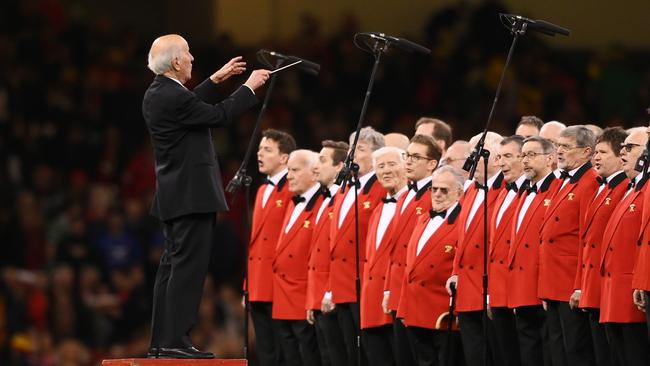In banning the singing of Delilah the WRU has made itself a laughing stock
Welsh rugby wanted to express its support for victims of domestic violence and this was how they chose to do so.

At the Thursday morning breakfast table, I got to thinking about Juan Antonio “Chi-Chi” Rodriguez. Chi-Chi is an 87-year-old Puerto Rican who once played golf for a living. He was very good: an eight-times winner on the PGA Tour who was later inducted into the Tour’s Hall of Fame. And yet Rodriguez is more famous for what he once said rather than anything he did on the course.
“Golf,” he claimed, “is the most fun you can have without taking your clothes off.”
On Thursday morning I thought, “Nah Chi-Chi, you were wrong there. This is far more fun.” I was reading the comments posted by our online readers to a matter-of-fact story about the decision of the Welsh Rugby Union to remove Delilah from the list of “approved songs” at the Principality Stadium in Cardiff.
The WRU wanted to express its support for victims of domestic violence and this was how they chose to do so. Fans were still free to sing Delilah but would no longer be led by the male-voice choir at the Principality Stadium.
Everyone had a view and there was remarkable unanimity. There were 617 comments and hardly one commenter thought banning Delilah a good idea.
This was WRU daftness more to be laughed at than railed against. Some of the comments were brutally funny. BJ Pigott offered his interpretation of the most contentious lines in the Tom Jones classic.
“There was cheating. He turns up, with a set of Viners (cutlery from Home Bargains). She sees him at the door, starts laughing. Then she sees the present and realises he is still serious about her. Realising her mistake, she stops laughing, and they lived happily ever after.” BJ thought this as plausible as any interpretation.

Phil Davison suggested changing the most controversial line to, “I called my wife on the phone and she laughed some more.” Jonathan Portch suggested it might be better to not sing another Tom Jones classic, Green, Green Grass of Home: “We are never told why Tom has been sentenced to death, though I thought it was because he killed Delilah.”
Paul Cantwell wrote: “This [the Delilah ban] should prevent all those people who would have heard the song from going out and murdering a woman. Phew, close shave.”
Martin Williams did, though, offer a sombre reminder of the dangers of singing Delilah. “My wife has told me my rendition of it has brought her close to wanting to inflict physical harm on me.”
Stephen Bowen argued that Bread of Heaven should also be banned. Surely “feed me ’til I want no more” encourages obesity. Wee Dave came to the realisation that during Covid, we were wrong to sing Sweet Caroline: “Hands, touching hands, reaching out, touching me, touching you.” Andrew Waude said it was surely time to stop calling the man in the centre of the front row “a hooker”.
On and on it went. You don’t have to be witty to subscribe to this newspaper, but it helps. I cried tears of laughter.
Breakfast never tasted so good. Underpinning all the mirth was a yearning for Welsh fans to go on singing Delilah and louder than ever.
There is, though, a serious side to the nonsense of banning a melodramatic song about a crime of passion, instantly regretted by the perpetrator. This virtue-signalling rubbish encourages people to want to stop listening to those who have a platform that could be used to contribute constructively to meaningful debate.
The WRU removed Delilah from their list of approved songs in part because of the recent BBC Wales investigation that revealed a toxic and sexist culture inside the governing body of their own organisation. Once the details of that story were examined, especially the rigour of the internal investigation following complaints by women who had worked for the WRU, the chief executive Steve Phillips resigned.
There was clearly a problem with the workplace culture at the WRU, as there is a problem with domestic abuse in the wider society. Police chiefs and politicians in Wales have continually highlighted the link between big rugby weekends in Wales and domestic abuse. In 2017 Huw Irranca-Davies made this point to the Welsh Assembly.
“When Wales played England in Cardiff during the Six Nations in 2009, South Wales police recorded a nearly 80 per cent increase in domestic abuse incidents, compared to the previous weekend. In the 2012 tournament, there were over 4300 calls to the all-Wales domestic abuse and sexual violence helpline. That was an increase of almost 10 per cent on the same period the previous year.”
As long ago as 2010, Detective Superintendent David Bishop linked the rise in domestic abuse incidents on rugby weekends to the consumption of alcohol. “Sadly, research indicates that during major sporting events incidents of domestic abuse increase because people are drinking more,” he told the South Wales Echo.
“South Wales figures in fact reveal that alcohol featured in more than 80 per cent of all arrests made relating to domestic incidents this time last year.”
The WRU had a choice here. They could have sat down and had a serious conversation. They could have explained how they got things wrong in their own offices and why two of their female employees considered ending their own lives after workplace experiences at the WRU.
They could also have discussed the customary jump in domestic abuse on rugby weekends in Wales and decided that they, the organisers of these games, needed to make a strong statement to highlight their disgust at the level of domestic violence around rugby weekends.
What could they have done? Well, police evidence says that domestic violence is linked to excessive alcohol consumption.
The WRU had it within their power to make a seriously strong statement and say, for one game, they could have banned the sale of alcohol at the Principality Stadium to make clear their abhorrence of violence against women.
Though it would send out a powerful message, banning alcohol at the stadium would also affect the bottom line.
So, instead, they cancelled Delilah. If you’re looking for the meaning of the word “pathetic”, you’ve got it right there.
The Times




To join the conversation, please log in. Don't have an account? Register
Join the conversation, you are commenting as Logout